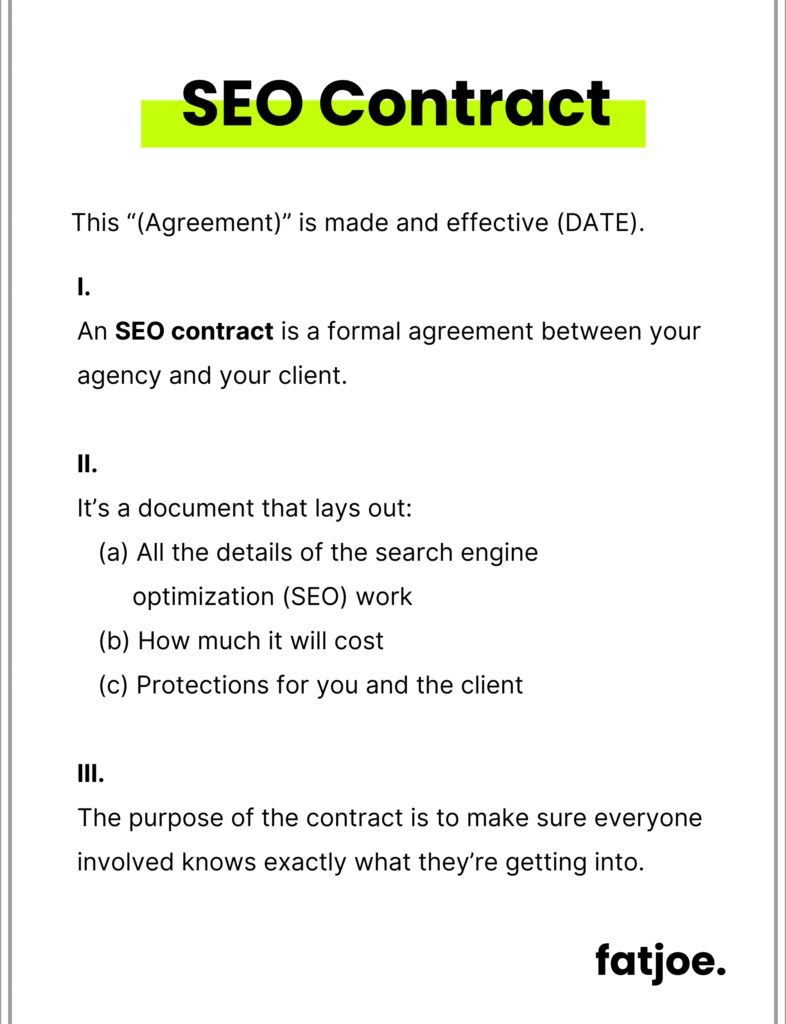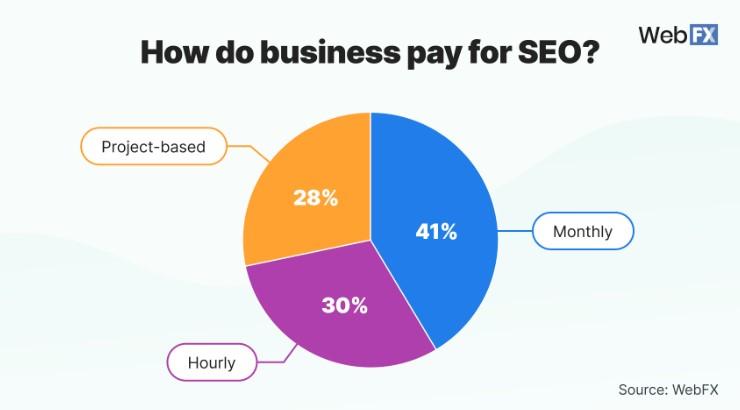You’ve wowed a potential client with your SEO proposal, and they’re ready to hire you.
The next step is to send over your SEO contract.
This document outlines all the details, like payments and the services to be provided.
It’s a super important part of the client onboarding process.
In this guide, we’re going to break down everything you need to know about SEO contracts.
We’ll cover:
- What an SEO contract is
- Why it’s important
- The types of SEO contract
- What to include
What Is An SEO Contract?

An SEO contract is a formal agreement between your agency and your client. It’s a document that lays out all the details of the search engine optimization (SEO) work, how much it will cost, and the protections for you and the client.
The purpose of the contract is to make sure everyone involved knows exactly what they’re getting into.
Why Use A Contract For SEO Services?
There are several reasons why you should use a contract when selling search engine optimization services. Here’s why:
Clarity for Clients
For your clients, a contract sets out what they can expect your SEO agency to do, how much it will cost, and the timeline for delivery. Along with your proposal, the SEO contract helps to set realistic expectations right from the start.
Without a contract, your client might expect more from your services than you initially agreed to. A contract makes it clear what you will provide.
Protection for Your Agency
SEO can be unpredictable, and there’s no way to guarantee results. Your SEO agreement gives you a layer of protection that you will receive payment for the services you provide.
It provides a reference point if it takes longer to achieve the desired results or if you encounter challenges that require additional work.
Keeping Track of Responsibilities
There are a bunch of different tasks involved in a successful SEO strategy. You need to do keyword research, link building, technical fixes, and more.
A contract outlines whether you or the client is responsible for these tasks. This is crucial if the client’s in-house SEO team is handling some tasks.
Managing Changes and Scope of Work
Sometimes, you’ll need to adapt your SEO strategy to achieve the desired results. You might need to create additional content or switch up your keyword strategy.
A contract can outline how to handle these changes, including how they affect costs and deadlines. If extra work is required, you have an agreed-upon process for managing it.
You’ll need to prioritize client communication throughout the project. Make sure your clients are aware of any challenges and recommend the best way to overcome them.
When it comes to SEO clients, communication & reporting are key.
Maintain a strong feedback loop.
Regular reporting helps you:
• Track progress
• Evaluate performance
• Realign priorities if neededCommunication is vital for keeping clients happy and getting great results.
— Matt Caramenico (@mcaramen) August 20, 2023
Types of SEO Contracts
There are three main types of SEO contracts. The right option depends on the type of project and the client’s needs.
Hourly Rate Agreements
Hourly rate agreements are pretty straightforward. In this type of contract, you charge a set amount for each hour of work completed.
This is a flexible option and works well for projects where the scope isn’t entirely clear from the start or could change over time. It’s also great for clients that require occasional SEO work done.
Flat Rate Agreements
A flat rate agreement is when you agree on a fixed price for the entire project. This is a set price, but it can sometimes change if the scope of work increases significantly. But that’s something you need to make clear in the contract.
This type of contract is useful when there are clear and achievable SEO tasks. For example, you might charge a one-off fee for a technical SEO audit.
Some clients prefer this kind of contract because it gives them a clear idea of the cost upfront.
Finite Contracts
This type of contract has a specific start and end date. You might agree on a finite contract with a monthly retainer fee over six months or a year.
A finite contract is typically used for full-service SEO packages. You charge a set amount for regular tasks like content creation and link building. It’s the best option when you’re looking to achieve long-term SEO goals.
But you should be careful with clients that want short-term, finite contracts. You need to set clear expectations about the results you can achieve during the contract length.
It’s a red flag if SEO clients want to sign up for 3 months only. Marketing budgets are signed off annually so SEO resource should be planned in accordingly.
— Ross Tavendale (@rtavs) June 23, 2023
Components Of An SEO Contract
A well-structured SEO contract contains several essential elements. Here’s what to include:
Payment Terms
The payment terms section details how much the SEO services will cost, how payments should be made, and when they’re due.
The majority of SEO agencies use a monthly payment structure, but this will depend on the type of project and contract you’re using.

Setting out clear payment terms helps avoid any confusion once you begin work on the project.
Late Payments Clause
The late payments clause covers what happens when client payments are delayed. It outlines any late fees, interest charges, or other penalties.
This clause can also encourage clients to make timely payments and help to protect your cash flow.
Mutual Agreement Clause
There are a ton of variables involved in SEO, and sometimes, the terms of a project need to change. The mutual agreement clause covers any changes to the original contract.
It makes sure that any changes are valid only if they are agreed upon by both you and the client. You need to outline the process that must be followed to modify the contract.
Confidentiality Clauses
Working on an SEO project often means you’ll be accessing sensitive information about the client’s business. The confidentiality clause is all about protecting that information.
It outlines your commitment and legal requirements to keep any business strategies and sensitive data confidential.
Termination Clause
Not all projects will go as planned. The client might have to cut back on marketing, the working relationship could become strained, or something might happen that prevents you from completing the project.
Bad SEO clients never turn into good SEO clients. Cut them loose fast.
— Nathan Gotch (@nathangotch) January 23, 2023
The termination clause outlines how you or the client can end the contract before the work is completed.
It usually includes details about notice periods, termination fees, and the process for winding down the project. This helps to minimize any conflict and disruption around the ending of the contract.
Breach of Contract Consequences
You also need to outline what happens if either party doesn’t fulfill their obligations. This is key for enforcing the contract and protecting your agency and the client.
You can include penalties, legal consequences, or other steps that will be taken if there’s a breach of contract.
Credit Card Payments And Legal Documents
While they might not be included in your standard SEO contract, it’s important to consider credit card payments and legal documents when working with a new client.
Credit Card Payments
Many clients prefer to pay for SEO services with a credit card. It’s convenient, fast, and offers some extra protection.
Accepting credit card payments can make your professional SEO services more attractive to potential clients. However, there are a couple of things to keep in mind.
First, you need to make sure you are set up to handle the payments. That means making sure your payment process is secure and complies with regulations like PCI DSS standards.
You also need to consider any processing fees. Payment processors typically charge a fee for credit card transactions. If you want to pass this fee on to your client, make it clear in your contract terms.
Legal Documents
Your SEO contract is a legal document. But it’s not the only legal document you should include in your onboarding process.
You’ll also need a privacy policy if you’re collecting any personal or business information from your clients. This policy should outline how you collect, use, and protect your client’s data.
You should also consider a non-disclosure agreement (NDA). You’ll already have a section in your contract about confidentiality, but many agencies also use a separate NDA.
Link Building And SEO Efforts Included In The Contract
The contract should clearly outline the strategies that are provided as part of your SEO campaign. That includes everything from keyword research and technical SEO audits to content creation and on-page optimization.
For example, you should detail the types of link building that will be done. Will you focus on local citations and blogger outreach or media placements and expert quote links?
Make sure you include all the specific SEO tasks that will be undertaken.
You should also define how success will be measured. Clients often focus on search engine ranking and organic traffic, but you should set clear expectations.
Having clear performance metrics helps to make sure everyone understands what success looks like.
Creating An Effective SEO Contract
A clear SEO contract is more than just a box you must tick before starting a project. It builds trust and sets the stage for a successful business partnership.
It also provides the protections you need to be confident in taking on new projects.
So take the time to get your contract right and start signing up new clients.
Become a Pro at SEO
Join 65,000 others and learn the secrets to SEO success with our weekly blog posts.
